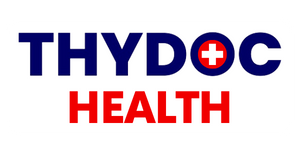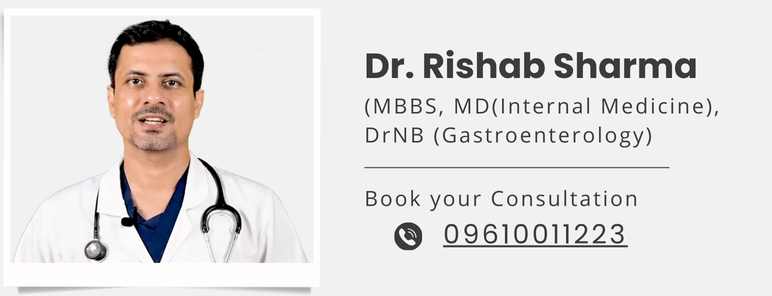Treatment depends on the severity of the condition and its underlying causes. Dr. Rishab Sharma ( MBBS, MD(Internal Medicine), DrNB (Gastroenterology), a leading Gastroenterologist in Ajmer Road locality of Jaipur, recommends the following:
1. Lifestyle Changes
Lifestyle changes form the foundation of treatment for fatty liver disease. Small, consistent modifications to your daily habits can have a profound impact on liver health. Let’s delve deeper into the key aspects:
Healthy Diet:
Your diet plays a critical role in reducing liver fat. A healthy, liver-friendly diet includes:
- Fruits and Vegetables: Rich in antioxidants and fiber, which help reduce inflammation and improve digestion. Examples include berries, spinach, carrots, and apples.
- Whole Grains: Foods like brown rice, oats, and quinoa provide sustained energy and are better than refined grains like white bread.
- Lean Proteins: Include chicken, fish, tofu, and legumes. Protein helps repair liver cells and reduces fat buildup.
- Healthy Fats: Consume foods with good fats like nuts, seeds, avocados, and olive oil. These support liver function without contributing to fat accumulation.
- Foods to Avoid: Limit sugar, refined carbs (e.g., white bread, sugary cereals), fried foods, and processed snacks. These contribute directly to fat storage in the liver.
Exercise Regularly:
Physical activity is essential for burning excess fat stored in the liver and improving overall health.
- Aim for at least 30 minutes of moderate intensity aerobic exercise daily (e.g., brisk walking, cycling, swimming).
- Strength training, like lifting weights or resistance exercises, also helps by improving muscle metabolism and reducing body fat.
- Even light activities like walking after meals can significantly improve insulin sensitivity and reduce fat accumulation.
Limit Alcohol:
Alcohol is toxic to liver cells and directly contributes to fat buildup and inflammation.
- For individuals with non-alcoholic fatty liver disease (NAFLD): Alcohol should be avoided entirely or kept to a minimum.
- For individuals with alcoholic fatty liver disease (AFLD): Complete abstinence from alcohol is non-negotiable, as it worsens the condition rapidly.
2. Weight Loss
Weight loss is one of the most effective ways to combat fatty liver disease, especially if obesity or being overweight is a contributing factor.
Why is Weight Loss Important?
- Excess body weight increases fat storage in the liver and around other organs. Losing weight directly reduces this fat.
- Studies show that losing just 5–10% of your total body weight can significantly improve liver fat levels, reduce inflammation, and even reverse early liver damage.
How to Lose Weight Safely:
- Balanced Diet: Combine calorie control with nutrient-dense meals. Avoid crash diets, as they can worsen liver health.
- Exercise Routine: Engage in both aerobic exercises (e.g., jogging, dancing) and strength training.
- Set Realistic Goals: Aim to lose 0.5 to 1 kg per week to ensure sustainable and healthy weight loss.
- Professional Guidance: Consult a dietitian or a doctor to create a personalized weight loss plan if needed.
3. Medications and Supplements
Currently, there are no specific medications approved solely for treating fatty liver disease. However, depending on the individual’s condition, a doctor may prescribe medicines to manage associated health issues.
When are Medications Needed?
- To Control Blood Sugar: For patients with diabetes or prediabetes, medications like metformin may be used to improve insulin sensitivity.
- To Lower Cholesterol: Statins or other lipid-lowering drugs may be prescribed to manage high cholesterol and triglycerides.
- To Reduce Inflammation: In severe cases, medications like vitamin E (an antioxidant) or certain anti-inflammatory drugs may be recommended.
- To Treat Underlying Causes: If liver damage is caused by other factors (e.g., viral hepatitis), appropriate antiviral or antifibrotic medications may be given.
Supplements for Liver Health:
Some supplements may support liver health, but they should only be taken under medical supervision. Examples include:
- Vitamin E: May help reduce liver inflammation, but not suitable for everyone.
- Omega-3 Fatty Acids: Found in fish oil, these can help lower triglycerides.
- Milk Thistle: An herbal remedy sometimes used for liver health, though more research is needed.
Important Note: Self-medication can harm the liver further. Always consult a doctor before taking any medicine or supplement.
4. Regular Monitoring
Regular check-ups are essential for anyone diagnosed with fatty liver disease, as the condition can progress silently without noticeable symptoms.
Why is Monitoring Important?
- It helps track improvements in liver health after lifestyle changes or medical treatment.
- Monitoring detects early signs of liver inflammation, fibrosis, or progression to cirrhosis.
- Regular tests ensure that other related conditions, like diabetes or high cholesterol, are also under control.
What Does Monitoring Involve?
- Blood Tests: Periodic liver function tests (LFTs) check for enzyme levels like ALT and AST, which indicate liver health.
- Imaging Tests: An ultrasound or FibroScan may be repeated to measure liver fat and stiffness.
- Consultations with a Specialist: Regular appointments with a gastrologist ensure timely guidance and treatment adjustments.
How Often Should You Monitor?
- For mild cases: Monitoring every 6–12 months is usually sufficient.
- For advanced cases: More frequent check-ups (every 3–6 months) may be needed to prevent complications.
Putting It All Together
Taking care of your liver requires a combination of the above approaches: adopting a healthier lifestyle, shedding excess weight, following medical advice, and staying vigilant through regular monitoring.
By focusing on these areas, you can not only reverse fatty liver disease in its early stages but also prevent long-term complications like cirrhosis and liver failure. Dr. Rishab Sharma, a trusted gastrologist in Jaipur, offers comprehensive care tailored to individual needs, ensuring a healthy liver and a healthier you!

